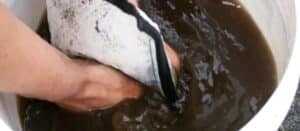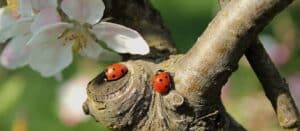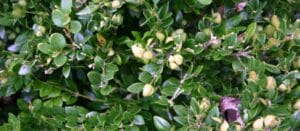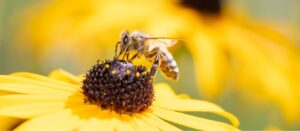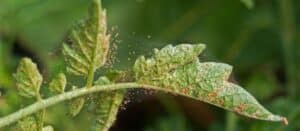As you may know, many birds migrate south during the fall months to spend the winter in warmer climates. However, not all birds leave New Jersey, Pennsylvania, and other northern states but spend winter here instead.
Your yard and landscape can help many native birds that remain here for the winter. In this article, we will cover various steps you can take to provide food, water, and shelter for birds, helping not only wildlife but also the entire local ecosystem.
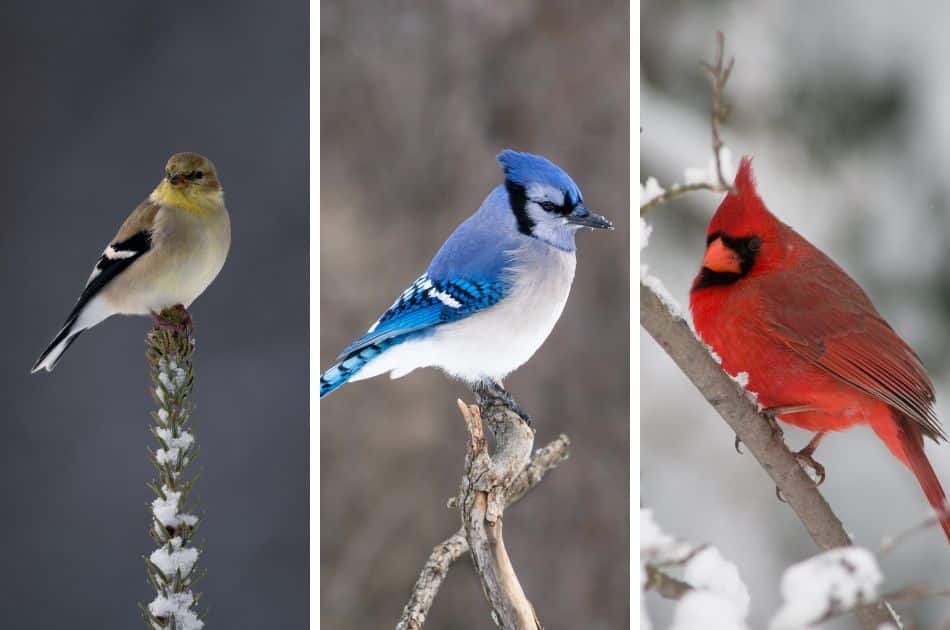
American goldfinch, blue jay, and northern cardinal are three types of non-migrating birds you may see in your winter yard.
Which Birds Spend Winters in New Jersey and Pennsylvania?
There are a wide variety of birds that you might spot in your New Jersey or Pennsylvania yard during the winter. If you provide food, shelter, and water for the birds, you may see a greater variety of them.
Some birds you may spot include northern cardinals, blue jays, downy woodpeckers, song sparrows, American crows, house finches, American goldfinches, and more.
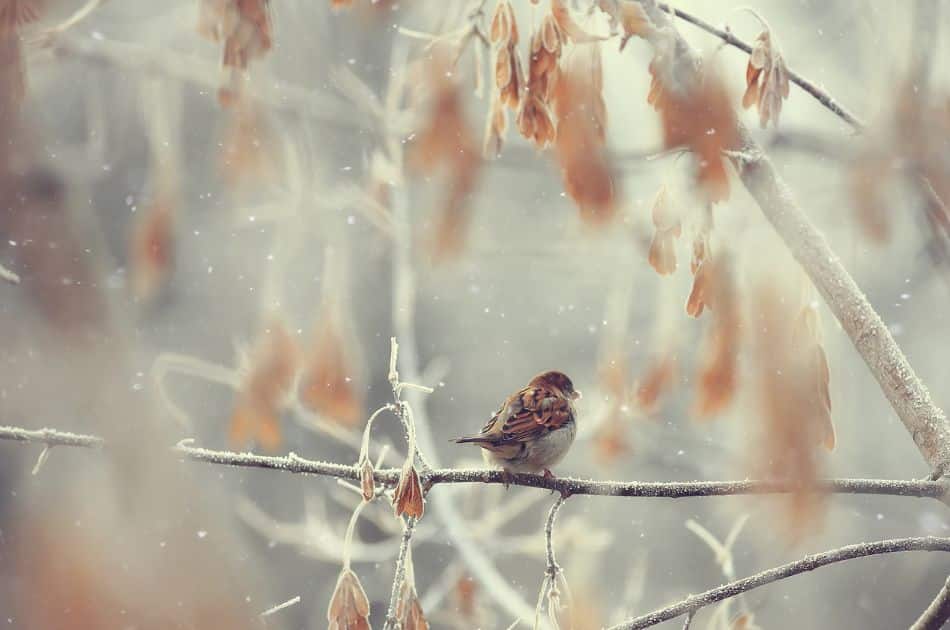
Why Do You Want Birds on Your Property?
Birds do more for us than we often do for them! They can bring color, life, and health to your property in many ways.
Birds Are Excellent at Pest Control
Did you know birds eat 400-500 million tons of insects in just one year?
Larger birds, such as owls, always search for rodents for food, even during winter. Rodents can damage your trees even under the snow, so having nearby predators is beneficial for the health of your trees.
Birdwatching is a Very Popular Hobby
Millions of people worldwide list birdwatching as a hobby and many clubs and groups exist for birdwatching. It is one of the fastest-growing hobbies in North America and is considered a multi-million-dollar industry. Over half of birdwatchers in the U.S. are under the age of 54.
How convenient that you can participate in one of the world’s favorite hobbies from the comfort of your own house!
It can be easier to spot birds in the winter thanks to the lack of leaves on deciduous trees and the bright white snow as a backdrop. If birds visit your backyard, you don’t need to deal with the elements to watch them!
Birds Signal a Healthy Ecosystem
Birds are part of the food chain, so spotting them on your property is often a good sign. Birds will eat the berries, fruits, seeds, nuts, or insects on your property, spreading the seeds to other locations.
If pesticides are used on your property, however, birds can die after eating pests on your property.
The potential harm to birds or other animals is one of the many reasons that Organic Plant Care uses organic or natural treatments whenever possible.
How to Help Non-Migrating Birds
Even if you live on a small residential property, your yard can benefit birds during the winter. We’ve included several options below; you can choose the ones that work best for your property.
At a minimum, planting, caring for, and maintaining native trees, plants, and shrubs can do a lot to help our local bird population as they provide food sources, shelter, places to roost, and more.
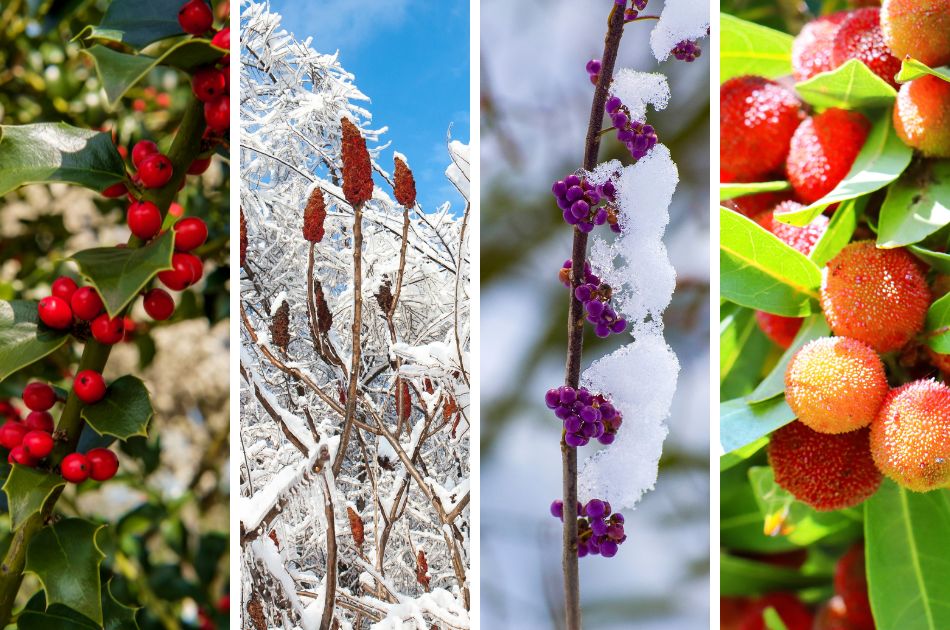
From left to right: American holly, staghorn sumac, beautyberry, and wax myrtle provide berries or fruit for non-migrating birds.
Incorporate Native Shrubs, Trees, and Plants with Berries or Fruit
Native birds benefit from food sources such as berries and fruit from our native plants and trees. Birds will often ignore the non-native fruit, so they don’t provide any benefit.
Some plants and trees that provide berries or other fruit for non-migrating birds include:
- Native Hollies
- Viburnums
- Hawthorns
- Staghorn Sumac
- Wax Myrtle
- Beautyberry
- Spicebush
- Chokecherry
- Virginia creeper
- American crabapples
- Serviceberry
- Mulberry
- Eastern red cedar
- Dogwood
Many of these trees and shrubs also provide visual interest in the winter, with brightly-colored berries, textured bark, or winter flowers.
View more trees and shrubs for winter interest >>
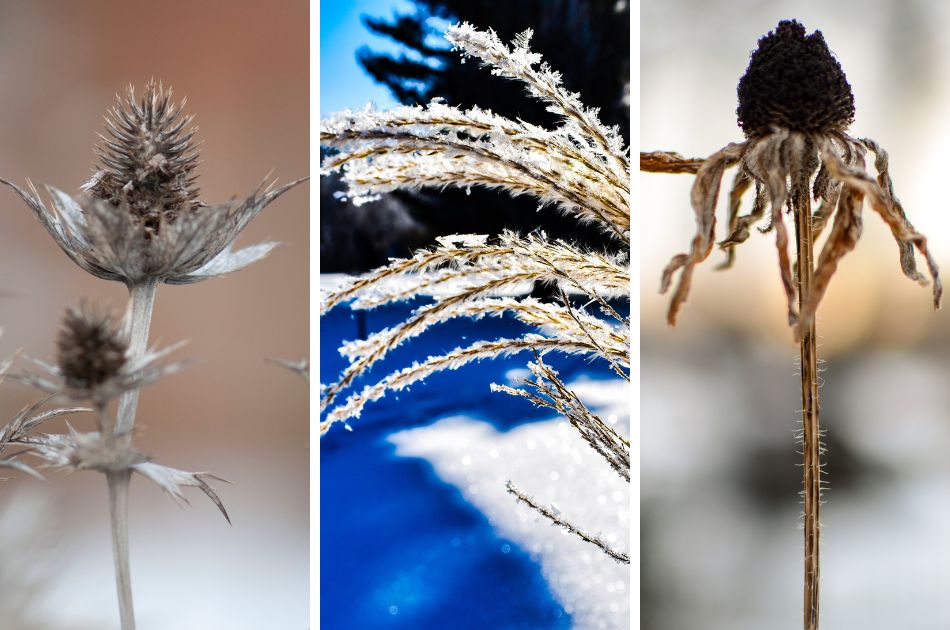
Coneflowers, winter grasses, and black-eyed Susans provide seeds for non-migrating birds during the winter.
Keep Seed Heads on Flowers and Grasses
Many perennials bear seeds after the flowers are done blooming. To ensure bird food options during the winter, don’t remove the seed heads, but keep them. They are an excellent food source for non-migrating birds and other animals and provide an attractive focal point.
- Coneflowers
- Black-eyed Susans
- Ornamental grasses
- Rudbeckia
- Salvia
- Coreopsis
- Sunflowers
Birds rely on high-protein and high-fat foods such as seeds and insects to keep them insulated during the cold winter nights.
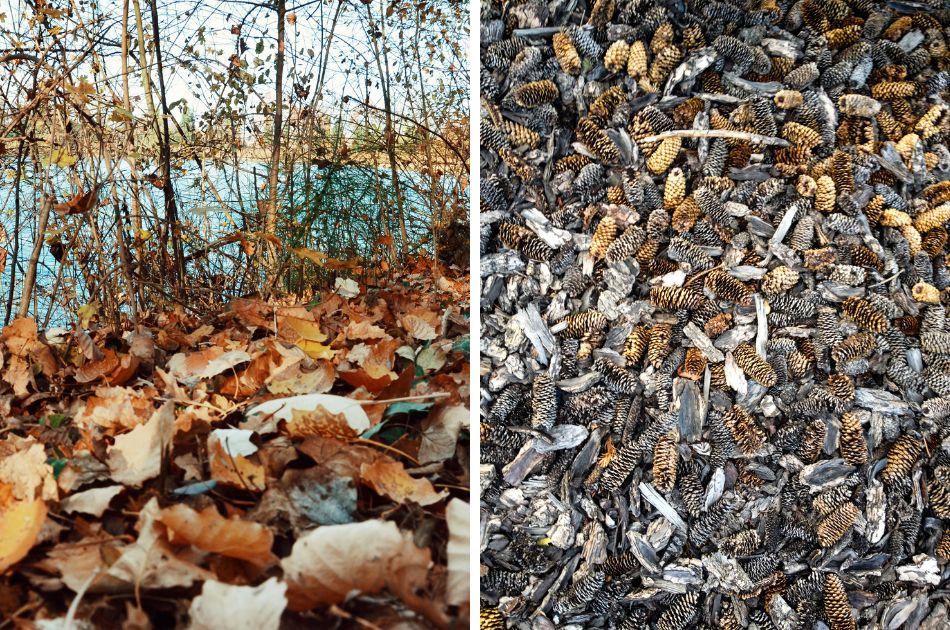
Leave Leaves On the Ground (or Create a Pile of Leaves in Your Garden)
There are several benefits to creating leaf mulch or leaf compost. You can leave the leaves on your lawn and run over them with a lawnmower.
Many insects rely on leaf litter for shelter during the winter months. Winter birds often forage through these leaves, looking for those insects (and insect eggs).
Insects are a food source that will help many birds survive the winter, so the simple task of leaving some leaves can help them greatly.
If your trees drop acorns or pine nuts, leaving them on the ground will provide a food source for jays, finches, and other birds.
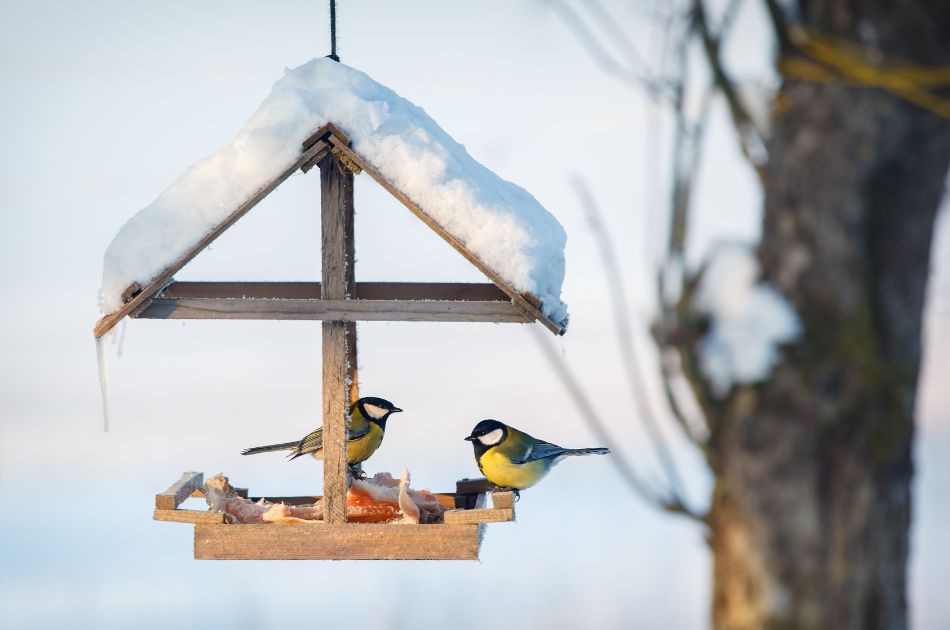
Clean and Fill Birdfeeders
Birdfeeders are another way to bring more non-migrating birds to your yard. Just make sure that you clean and refill the birdfeeder often.
Provide Access to Water
Drinkable water can be hard to find once ponds and lakes freeze over. If you have a birdbath, you can attach a birdbath heater to keep your water from freezing during the colder times of the year.
Include Sheltering Options
All trees and shrubs, especially evergreens, provide places for birds to rest and shelter from the elements. Birds such as cardinals and bluejays prefer dense evergreen foliage for sheltering from the winter weather and predators.
Some birds, such as woodpeckers and owls, will roost in tree cavities.
If you have birdhouses, keep them up during the winter. Birds will use them to shelter from the elements during the winter months.
Minimize Dangers for Birds
Cats kill around 2.4 birds yearly in the United States, so beware of the potential danger to birds if you have a cat but want to protect your local wildlife.
Birds colliding with glass (usually windows) is also a leading killer of birds – causing 1 billion bird deaths each year in the U.S. alone.
Habitat loss negatively impacts bird populations. Keep this in mind if you have removed several trees at once or are in an area made up of new construction. Even removing one tree can impact much of the local wildlife.
Maintain your older trees and replace those that are removed when possible. Sometimes, dead trees, known as snags, can provide roosting options for birds. It also attracts insects, which provides another food source for birds.
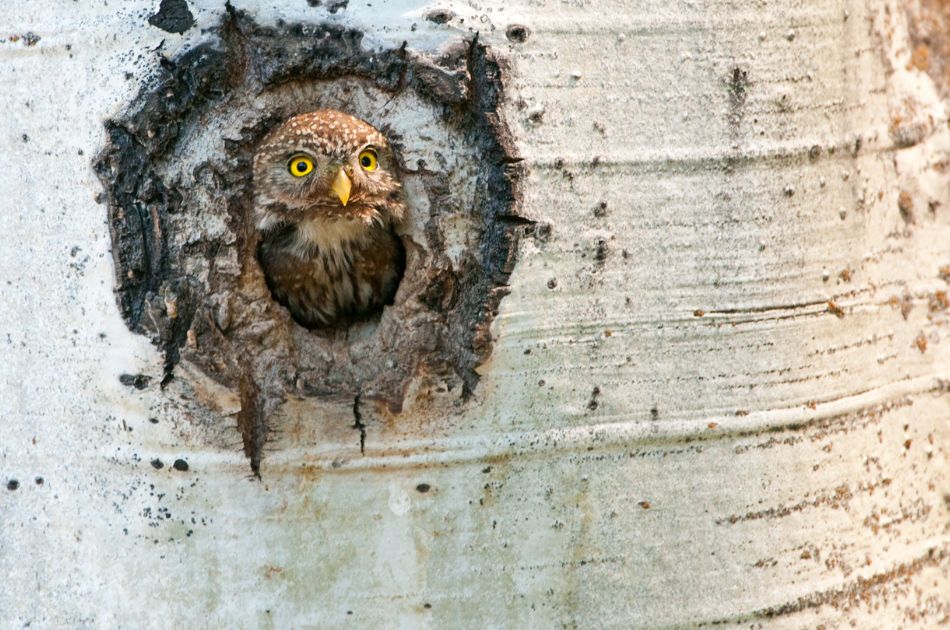
Your Property Can Make a Positive Difference!
If you want to learn more about how to use organic products to treat tree pests and diseases, view these resources on our website:
- Organic Lawn Care
- Organic Lawn Fertilization
- Organic Grub Control
- Organic Tick & Mosquito Control
- Organic Fruit Tree Care
- Organic Tree and Shrub Fertilization
- Organic Shrub Care
- Soil Testing, Analysis, and Interpretation
- Soil Conditioner
- Pest & Disease Treatment for Trees and Shrubs
You can also learn How Your Yard Can Benefit Local Wildlife (scroll down to this section).
Contact Organic Plant Care today to begin implementing organic options on your New Jersey or Pennsylvania property!
GET THE LATEST NEWS
Subscribe to the Organic Plant Care Newsletter and get timely and helpful tips and updates monthly.
There's no spam - we promise!

